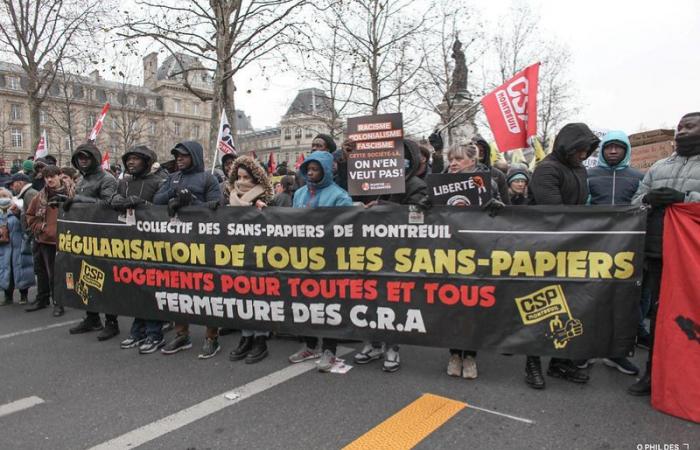For several months, some voices have been raised against the reactionary escalation taking place on Place Beauvau against immigrants. From Sophie Binet to Olivier Faure, including a large part of the institutional and union left, the “response” to the government’s anti-immigrant policies, however, is part of the same argument. Retailleau’s racist offensive would be criticizable morally, politically, etc., but above all because it would miss the essential: “immigrants” serve to something; they are useful.
“Our position is to say that we must put an end to a form of hypocrisy, with these women and men who keep the country on its feet, who work, who are often in conditions of exploitation, and these must be regularized » explains Olivier Faure. Sophie Binet also argues that: “immigrants work and bring back much more to the country than they cost it”.
All the surveys and studies on the subject of immigration corroborate these words: immigrants bring in more than they cost. There is, however, a problem with immediately enclosing any debate on immigration within an accounting logic. Since immigration “profits”, we still have to ask ourselves which immigrants are profitable ? And very often this leads to sorting between undocumented workers and other undocumented workers. This is particularly the case of Olivier Faure, general secretary of the Socialist Party who defends regularization reserved only for undocumented workers.
The logic, beyond the difference in posture and program, is in reality no different from that which drives the various employers’ organizations regarding the current xenophobic offensive. Assuming a position which qualifies the proposals of the Minister of the Interior, the president of Medef defended in this capacity last September at the microphone of France Info the need to “not refrain from resorting to all levels of qualification to immigrant labor force. He added that his organization is “against undocumented immigrants because in terms of distortions of competition, it is unacceptable”. A position endorsed by Labor Minister Astrid Panosyan-Bouvet who explained that she wanted to “work” on the subject with her Interior colleague, Bruno Retailleau.
And a line that is also in line with the proposal for the title of professions in tension in the latest immigration law carried by Gérald Darmamin and voted on last January. This title, defended by part of the employers and the union and political left, sought to promote the regularization of undocumented workers in sectors in which labor is scarce. This measure, presented during the debates as the progressive aspect of the law, however, in reality only constituted a means of ratifying the overexploitation of undocumented workers in the most difficult and poorly paid sectors. For example, in the personal assistance sector alone, considered to be a sector in tension, there are 25% foreign workers.
This expanding logic has been accompanied by the intensification since the 2000s of the hunt for illegal foreigners in the workplace, thus largely contributing to fueling the overexploitation of foreign workers. The law of July 24, 2006, which reintroduced the work-related residence permit and authorized exceptional regularizations for undocumented immigrants sponsored by their employer with an employment contract, had the corollary of further encouraging immigrant workers to accept no matter what job while making them more dependent on their bosses. At the same time, those who refused to fill vacant jobs and poor working conditions saw their expulsion facilitated. Blackmail that only benefited the bosses.
Furthermore, this regularization almost exclusively through work is part of a logic of multiplication and hierarchy of residence permits which result in in fine to a precarious stay. Recent restrictive migration policies organize this undocumented factory which is largely functional to the capitalist system. This “pyramid organization” [1] of immigration according to the stability of the residence permit establishes permanent pressure, like a sword of Damocles on the heads of undocumented workers so that they accept their assignment to superexploitation.
From overexploitation to racist consensus
All these positions, which have in common that they condition the regularization of undocumented immigrants in a more or less assumed manner on their profitability for employers, also play a dangerous and even more insidious game. This false debate on the costs/benefits of undocumented workers for employers in fact helps to reinforce the pro-immigration policies chosen against said immigration and, ultimately, fuels the xenophobic and racist consensus at work. The immigrant is then perceived as acceptable on the condition that he is a resource, a body that can be forced to work at will which will allow employers to lower the costs of labor, including “white”, in sectors which are not not relocatable like construction, personal assistance or catering
Agreeing to defend the logic of chosen immigration means defending the precariousness suffered by all undocumented immigrants and a deterioration of the conditions of the entire working class. Such a position amounts to largely adapting to the proposals of the National Rally and more broadly to reactionary migration policies. It seeks to “reassure” national workers who have been told for years that immigrants “will steal their jobs” or that they “take advantage of public services”. As a way of saying: “don’t worry too much, national workers – and whites – some immigrants bring us money”. Proposals which therefore prove useless or even dangerous when fighting against the racism which infuses our class.
However, on this path, the “left” played an active part. Adaptation to liberal language and its policies is indeed nothing new. We will think, for example, of the protectionist and nationalist line of the Marchais years in the PCF or even of François Mitterrand who, in the 1990s affirmed that the “threshold of tolerance” of the French towards foreigners had been reached in the 1970s. By gradually joining the position of the right, the PS ended up imposing the idea that there would be no alternative and that immigration would constitute in itself a problem whose negative consequences would need to be minimized.
Finally, we will note to what extent the discussions around the “benefits” of the immigrant worker, from the RN to the left, are part of a broader discussion on the productivity of immigrant workers or not. How can we not see that the anti-immigrant escalation of the far right and Macronism and the anti-social offensive against “welfare” share the same vocabulary and the same intrinsic logic? How can we not see that in the current austerity sequence it is all workers who are threatened here and there with layoffs or salary cuts precisely because the crisis means that they no longer “bring in” enough?
There would obviously be a broader discussion to bring to the debate on who makes “society run” and especially for whose benefit. But by reducing this issue to the sole question of immigration, the heralds of “the usefulness of immigration” participate in a double division: between immigrants themselves (those who would be useful and those who would not be useful). not), then between immigrant workers and national workers.
Against these logics of division and adaptation to the xenophobic and security consensus, unions and organizations which claim to be on the left should on the contrary seek to unify national and immigrant workers and refuse the logic of precariousness of stay at home. artwork. This involves demanding the regularization of all undocumented immigrants without conditions, the opening of borders and freedom of movement for all. While the government is carrying out major austerity policies and employers are planning massive layoffs, these demands must be accompanied by the defense of the sharing of working time between all, and the end of precarious contracts. These are the only measures capable of reducing unemployment, putting an end to the overexploitation of part of our class and to the division of foreign and national workers which only benefits the big capitalists.






